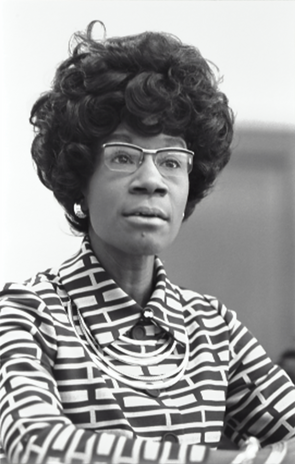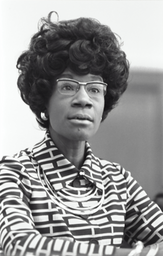I first heard the name Shirley Chisholm in my freshman-year Women’s Studies class. Of the numerous women we studied in depth, Shirley Chisholm had the greatest impact on me. Watching her documentary, Chisholm ’72- Unbought & Unbossed, was one of my most memorable lessons in college to date. I was shocked (and frustrated) that in all my years of public education, the name Shirley Chisholm had never been mentioned.
Shirley Anita St. Hill Chisholm was born on November 30, 1924, in Brooklyn, New York. Even from an early age, Chisholm proved to be an outspoken, dedicated activist for intersectional rights. Chisholm was the oldest of four daughters born to working-class immigrant parents. Her father Charles St. Hill was a factory worker from Guyana. Her mother Ruby Seale Hill was a seamstress from Barbados.
Chisholm attended Brooklyn Girls’ High in 1942 and subsequently graduated from Brooklyn College cum laude in 1946. Her vibrant energy and numerous accolades with the debate team caused professors to urge her to explore a career in politics, to which she responded that she faced a “double handicap” as both Black and female.
After graduating, Chisholm worked as a nursery school teacher. She then went on to earn a master’s degree in early childhood education from Columbia University in 1951. Chisholm became heavily involved in local social justice organizations, including the League of Women Voters, the NAACP, the Urban League and the Democratic Party Club in Bedford-Stuyvesant, Brooklyn.
Her political activism allowed her to run for and win the position of second African American in the New York State Legislature. Her tenacity was unmatched. Chisholm would go on to score a seat in Congress soon after, earning the nickname “Fighting Shirley”. She co-founded the National Women’s Political Caucus in 1971; in addition, Chisholm became the first Black woman and second woman ever to serve on the highly esteemed House Rules Committee in 1977. The same year, she married Arthur Hartwick Jr., a New York State Legislator.
Chisholm proudly owned an identity that would be considered a “disadvantage”, especially during the pre-civil rights period. Nonetheless, “Fighting Shirley” became the first Black woman to run for U.S. President. Discrimination and bias overshadowed her campaign. White male journalists degraded her and accused Chisholm of “female meddling” and “vaginal politics”. She was even initially barred from participating in televised primary debates and was forced to “File a complaint with the Federal Communications Commission in order to participate in a televised debate featuring McGovern and Humphrey,” according to John Nichols at The Nation.
She had a profound impact on Black women, but more broadly, Chisholm inspired all feminists to examine intersectionality. Though it was Richard Nixon who prevailed as president in the 1968 election, Chisholm’s iconic legacy has had arguably just as much, if not more, impact on american history than a traditional presidential term. Shirley Chisholm noted that she wanted to be remembered as “A woman… who dared to be a catalyst of change.” I think we can all agree that Fighting Shirley succeeded in this sentiment.


